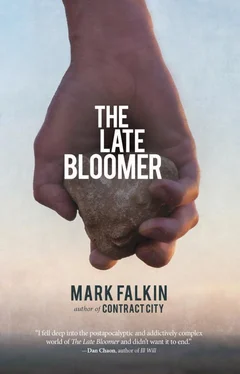Full dark by the time I reached the letter avenues intersecting Forty-Fifth. I haven’t driven alone in the dark since chasing the train. That had felt different. I still had friends waiting at home.
No streetlights, no ambient light from storefronts. Pitch dark. Not even a moon shone for the rain. I had my brights on. No oncoming traffic to blind. Deer and cats darted across. “Slow and steady, steady and slow, that’s the way we always go,” I said to Maggie over my shoulder in Goofy the Disney dog’s voice. Her tail thumped and she put her snout on my shoulder. I smelled bad egg sulfur and Nate’s blood.
The blood smell reminded me of feral kids. This was no river. When would the windshield turn into stars from thrown stones?
Forty-fifth Street crosses train tracks before the airport which takes you out southwest to Highway 71.
We rolled slowly like we’re patrolling.
Maggie growled in my ear.
There.
They suddenly appeared in the headlights along the train tracks as if arising from the earth itself. They stood in rank after tight rank like a phalanx of Trojans. I stopped the car, flipped on the search light. I dragged the beam slowly along them, examined each face in the front row. Mannequins in the cold rain. Not a pair of eyeglasses rested on a nose. They blinked in dolorous synchronicity. They didn’t utter a sound, didn’t move. Though winter approached, they wore no coats. Some wore the pajamas they woke up in the morning of, some the filthy clothes of that morning, what they would’ve worn to kindergarten and elementary school. They quaked and stood stone-faced.
Despite my ire toward them, in that moment I found myself suddenly overwhelmed with the need to connect to them. I felt such pity for them. I craved the ability to expand my reach so that I could surround them with my arms and hold them tight and tell them we are all going to be okay like I had Johnny and Nate.
I know they did what they did mindlessly, without conscience. When an animal does something vile yet in its nature, you find it abhorrent, but you understand. You can forgive it. Although what Maggie and the Utopia dogs did was beyond abhorrent—the thought of him running from them in his panic with that basket of eggs, their baying and snarling and running him down and when he screamed they tore into him even more. But, ultimately, I could forgive them.
But these are human children. They’ve woken up to this new world and they haven’t a clue what’s happening. I can forgive them.
I put my lips to the loudspeaker handset. I pressed the button. “I forgive you.” It came out loud and authoritative.
The rain came down harder and they shook more.
“Let me by, at least,” I demanded.
They moved shoulder to shoulder in one quick motion. It was a bit more than that, dear reader. A bit more than shoulder to shoulder like the von Trapp children.
Their faces all morphed. A wave radiated through.
My heart beat in my ears.
I got out and stood behind the open car door holding the handset. “Why?” I called out to them in a plangent voice, almost begging. “Why won’t you let me go?”
I flicked on the red-and-blue lights. Nothing. I blasted the siren. Nothing. Not a blink. Nothing but shivering bodies so tight they looked woven together.
I looked closer. I was the one blinking in the rain, in disbelief.
Maggie rumbled low from the back seat.
I got back in and put the car into drive and pulled up so that we were twenty feet from them. The headlights and emergency lights splashed all over them. Their eyelids flexed in the lights and rain. Drops sparked as they passed through the beams.
Their shivering became shaking. Then it became a fearsome quaking, set to explode.
Their flesh—at their bare places, elbows, knees, ears, and even cheeks. The skin started to… join.
The white stuff. A mesh of it flung out like webbing, conjoining them. Before my eyes, in seconds, that latticework thickened. They formed a human wall.
I put my shaking hand to my mouth. My body and mind thrummed with ancient terror.
All the noise in the world was the sound of rain hitting the pavement and car metal and Maggie’s throat rumbling. In my rearview I saw the silhouette of her hackles rise. I felt my hair and skin rise and turn to gooseflesh.
The kids’ skin morphed and connected. Ours rose and spiked.
Organisms displaying vital tropisms at a standoff.
In park, I revved the engine, let it fall off. I repeated this, the car lifting and surging, hoping to threaten them. Angry with them, I threw open the door, pulled out the glock, stood between car and door, and drew the gun down on them.
They stepped forward. I didn’t move. They came at me, moving together. The lines of them extended beyond the road. They rose together out of the foliage and trees on both sides. Before they could surround the car, I jumped in and reversed with the pedal floored.
Fifty yards up the street from them, I spun the car around, stopped, and looked in my rearview. They, too, had stopped, and I could just see that they drew apart into individual beings again.
The rearview mirror shook with the police car’s acceleration.
It stood behind the children.
Its spread wings spanned beyond the road.
I’m flying down south on Red River, trying to beat them over on to I-35. Up ahead looms UT’s indoor athletic practice facility, which had been a huge white dome made of air-inflated fabric. The dome was gone; the thing looking like a collapsed cake.
I swung a hard left and there they were, spanned across Dean Keeton Street.
Back down Red River I flew, past the stadium, through MLK, assuming they’d have an established checkpoint there too. Past Brackenridge Hospital, through the Red River music district. I didn’t want to cut over yet, didn’t want to lose time against them.
There couldn’t be enough of them to cut me off at every turn. At some point they’d get spread too thin. I get down to First Street going freeway speeds, catching air in this police cruiser more than once, Maggie hitting her head on the ceiling.
When they were all together like that, I knew I couldn’t physically get through. I couldn’t do it anyway, plow into them like that idiot at South by Southwest a few years ago, at Charlottesville. If I did, I’d take the first three rows of kids out, but they’d be all glued together like that and by sheer mass and size they’d stymie and surround me.
Then what? I didn’t know.
I thought of Nate as the dogs surrounded to him. His cries echoing the cliffs.
The frontage road to I-35 becomes visible. I punch it. I’m getting through. I’m laughing with Maggie. We come over the rise doing eighty and I imagine thousands of children running to this spot realizing that they aren’t going to make it and their collective panic rising into some frenzied quantum entity capable of doing things I can’t conceive.
We take the rise. We catch air. My headlights skim the clouds. Rain drops little meteors. I’m flying.
The tires hit the pavement and there it is. A pile of everything they could get their little hands on, all smashed and swirled together forming a macabre mountain, a mockery of the old world. Reminded me of the pile of furniture in the bottlenecked street in Les Misérables , but this one was lined with corrugated metal and an actual stop sign they’d transplanted into the middle of it all. It was thick, it was tall, and it covered the access road and well beyond into the dark. Off-roading over the wet ground, down the slope, would be chancy at best.
The stop sign bore their handprints like paleo cave walls.
They’d done this everywhere, I knew. In every street out of the city there would be old-world heaps. Busy beavers while I was gone. Sure, I could try to blow them up with scavenged explosives (blowing my hands off and bleeding to death in the process) or plow through them with a vehicle from Camp Mabry. And let’s say I could even start making headway through. They’d be waiting for me on the other side.
Читать дальше












